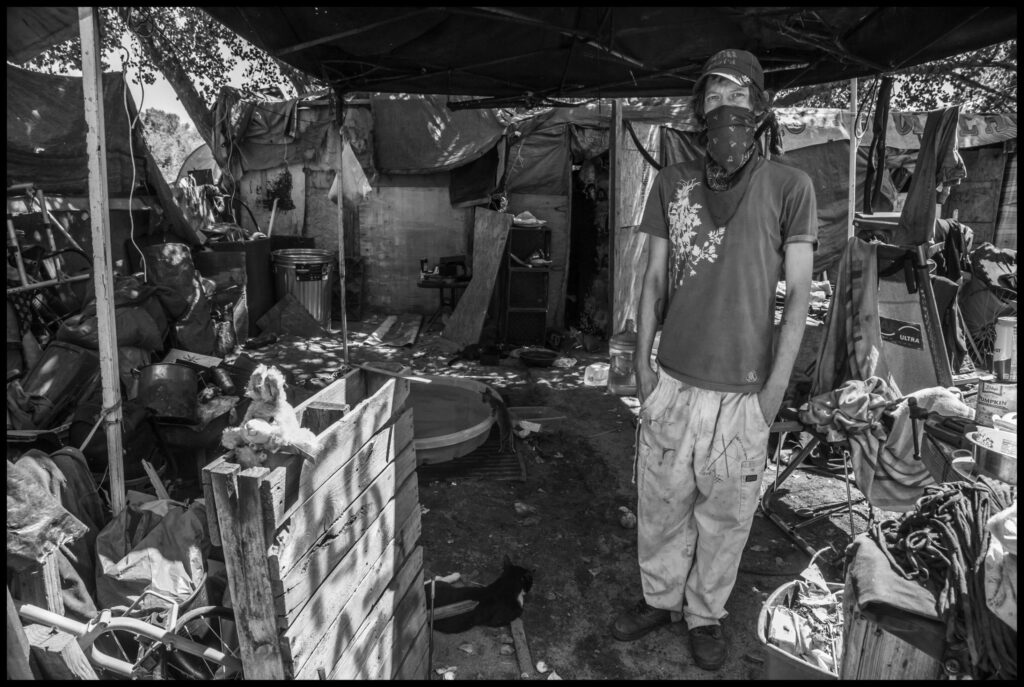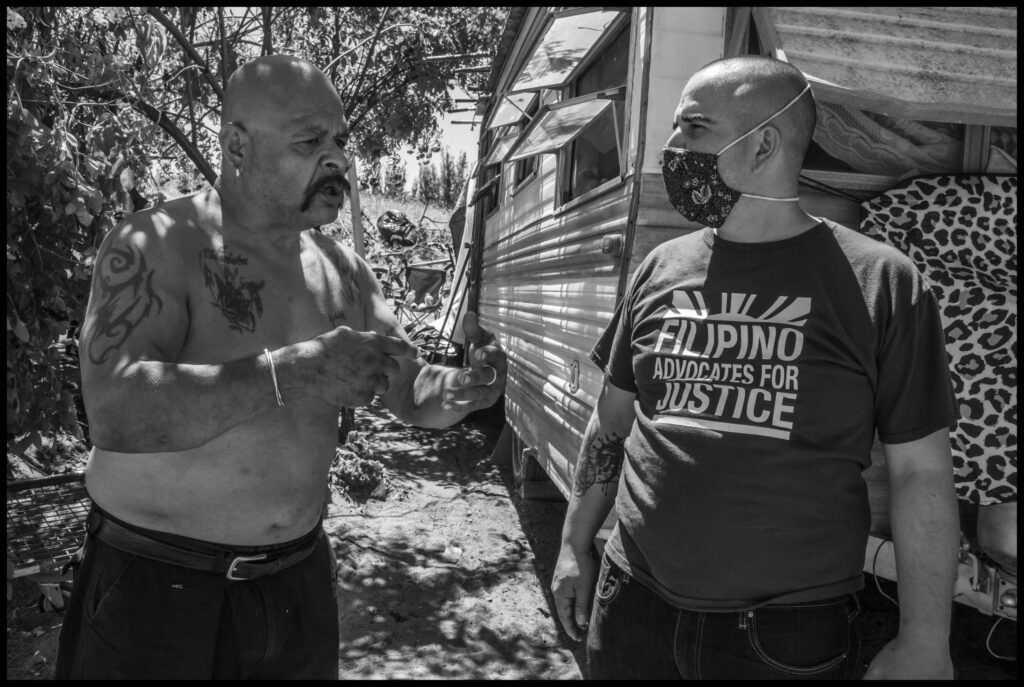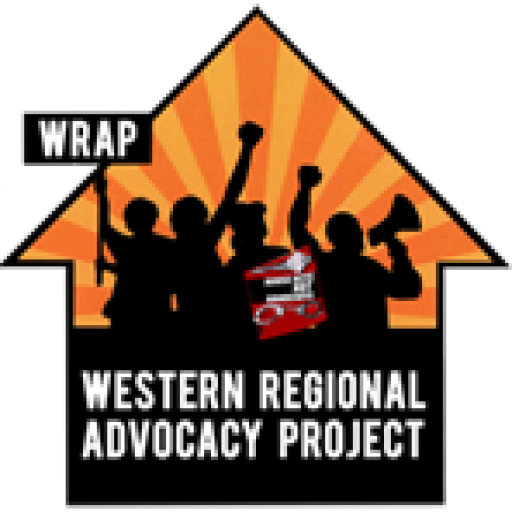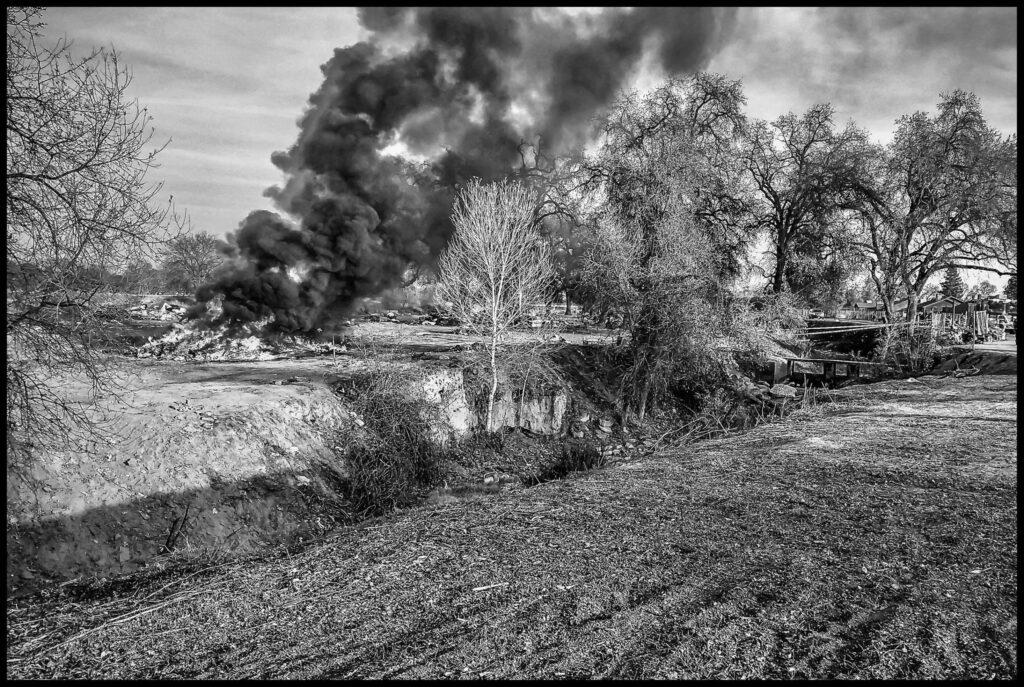It was after midnight on Jan. 18 when Tulare County sheriffs walked into the encampment of unhoused people on the levee of the Tule River. “They parked on the highway,” remembers Rosendo “Chendo” Hernandez, who shares a small trailer parked under a tree with his partner Josefina. “I heard them walking around in front, and then they called out to me to open my door. They said we were trespassing on private property and we had to leave.”
Co-published by the Visalia Times-Delta
Sheriffs made him sign a notice, Hernandez says, giving him a week to remove his possessions and find another place to live. Deputies then went to other levee residents who have set up shacks or impromptu shelters along the river. Mari Perez, the executive director for the Central Valley Empowerment Alliance, which just operates out of the Larry Itliong Resource Center in nearby Poplar, estimates that includes about 150 people. “They said they’d arrest us if we didn’t sign,” Hernandez recalls, and one officer, he charges, drew his gun. “People are on edge, especially because of what happened on the St. John’s River.”
A photo taken by a local activist of the St. John’s River levee encampment fire.
The sheriff’s warning to the Tule River residents came 10 days after police in neighboring Visalia, Tulare County’s largest city, evicted another group of people on the St. John’s River levee. Residents there were forced to take what possessions they could carry, while heavy construction equipment piled up what was left. A fire later broke out in which those possessions were incinerated.
* * *
Tulare County is not unique. Similar situations face unhoused people across the state. Here they are unfolding along rivers in the heart of the San Joaquin Valley, the country’s richest and most productive agricultural region. That wealth, however, does not produce housing for the valley’s impoverished residents, who instead face the use of law enforcement to remove them and render them invisible.
The use of police to get rid of the encampments of people living outdoors is hardly new, whether in the San Joaquin Valley or the rest of California. In 2009 a sweep by Visalia police of St. John’s River camps was witnessed by Bill Simon, then chair of the Fresno chapter of the American Civil Liberties Union. Afterwards, “The river was as empty as the dreams of the homeless who were being evicted,” he observed. “Some people [had] lived there for as long as seven to 14 years.”
Fresno, the valley’s biggest city, not only has the largest number of residents living on the street, but a long history of efforts to make them leave. The city passed a “ban on camping” on the streets in August 2017. In 2018 police had 9,000 “contacts” with people sleeping on sidewalks, yet their numbers continued to swell.
Fresno, the Central Valley’s biggest city, not only has the largest number of residents living on the street, but a long history of efforts to make them leave.
Jerry Dyer, former Fresno chief of police, was elected mayor last year, and he announced a new initiative on Jan. 22, “Project Offramp,” to force homeless people to leave camps set up on the property of Caltrans. “Even though it’s not our jurisdiction,” Dyer admitted, he will send police and city workers to tell the people sleeping near freeways to leave. “We can’t get used to homeless people living in our neighborhoods … It’s time we reclaim our neighborhoods and reclaim our freeways,” Mayor Dyer earlier told the local Fox affiliate.
The Offramp project will supposedly find housing for the 250 people which Dyer estimates live near freeways. But they are only some of the 2,386 people living out of doors in Fresno city and county in 2020, an increase of 598 just from the previous year.

(Photo: David Bacon)
Nevertheless, in 2019 the U.S. Supreme Court backed a ruling by the Ninth Circuit Court of Appeals holding that “people experiencing homelessness cannot be criminally punished for sleeping outside on public property if there are no available alternatives,” according to the National Low Income Housing Coalition. NLIHC president and CEO Diane Yentel explained, “Cities must stop attempting to criminalize and hide their communities’ homeless people and instead work toward providing real solutions, starting with the only thing that truly ends homelessness: access to safe, affordable, accessible homes.”
Tulare County clearly can’t deal with the number and rapid increase in people who have no adequate place to live.
Police and sheriff actions to eliminate outdoor encampments, therefore, require that displaced people must have access to alternative housing. Hernandez says that the notice from the Tulare County sheriff claimed replacement housing was available, although the deputies couldn’t tell him where it was. “A trailer park would charge us $450 a month,” he says, “and we just don’t have it.” Last year the New Porterville Rescue Mission on A Street was closed by the city after it couldn’t come up to safety and health codes, and one resident complained of pervasive cockroach infestation.
* * *
Part of the Tule River levee lies inside Porterville, while part of it is in the county’s unincorporated area. According to the Kings/Tulare Homeless Alliance’ 2020 Point in Time survey, 704 people in Tulare County were sleeping outside and more than two-thirds of them had been doing so for more than a year. Over half are Latinos or other people of color, and their number has nearly doubled since 2013. In Porterville itself 174 people were unsheltered. Only 163 people in both Porterville and the surrounding county were able to find beds in a shelter. While social services exist for unhoused people, Tulare County, like every county in California, clearly can’t deal with the number and rapid increase in people who have no adequate place to live.
Sleeping in shelters, however, is dangerous during the pandemic. The Centers for Disease Control and Prevention advises that “if individual housing options are not available, allow people who are living unsheltered or in encampments to remain where they are. Clearing encampments can cause people to disperse throughout the community and break connections with service providers. This increases the potential for infectious disease spread.” Instead of forcing people to leave, the CDC asks authorities to improve sanitation, and provide bathrooms with water and washing materials.

The CDC recommendation was the basis for a court decision in Santa Cruz on Jan. 20, in which federal Judge Susan van Keulen stopped City Manager Martín Bernal and the police department from evicting people living along the San Lorenzo River. Bernal’s efforts led to a confrontation between police and residents, who were supported by community activists, on Dec. 28. Afterwards Van Keulen issued a temporary restraining order against the city.
In Tulare County community organizer Mari Perez says residents along the levee are considering similar legal actions, and attorney Michael Bracamontes has written a warning letter to the board of supervisors. “The Tule River inhabitants,” he charges, “are not being punished for any voluntary act, but instead for their involuntary status of being homeless. Because the Tule River inhabitants have nowhere else to go, they are forced to choose between sleeping exposed to the elements or subjecting themselves to criminal punishment by sleeping by the river.”
Meanwhile, the situation has grown more tense since deputies detained Hernandez for a parole violation, although he was released two days later on his own recognizance. His detention added to the fear that the deputies might arrive at any moment to begin evictions. Hernandez had been helping bring public attention to the situation of the river dwellers. “If we’ve got to go we’ve got to go,” he said glumly. “But where? It wouldn’t be so bad if we just had a place to go, but we don’t. And if we’re moved out we could be a lot less safe. The COVID is out there, everywhere you go.”
Update: Capital & Main contacted the Tulare County Sheriff’s Dept. last week for comment and received a response after the article was published. In it, department spokeswoman Ashley Schwarm states that notices were given to “several individuals who have set up encampments on private property” requiring them to “vacate those areas.” The notices don’t guarantee housing options, she says. Our question asking who the owners are was unanswered.




Leave a Reply
You must be logged in to post a comment.